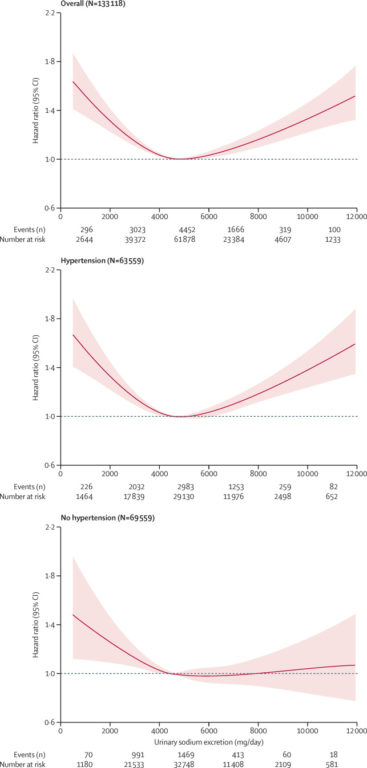This 2016 paper combined data from multiple prospective cohort trials to assess the relationship between dietary sodium intake (as estimated by urinary sodium excretion) and health outcomes.
Multiple previous analyses, most famously including the PURE study, have found a U-shaped relationship between sodium intake and negative cardiovascular and health outcomes — that is, both low and high sodium intake increase health risk. This paper combined data from PURE with three other prospective cohort trials to generate a sample of 133,118 individuals followed for a median of 4.2 years. Approximately half of these subjects (63,559) were hypertensive at baseline.
Investigators estimated sodium intake by measuring sodium excretion; while indirect, this is a validated method that has been shown to correlate well with actual intake (a brief analysis of this correlation is provided within the procedures section of the paper). Note that for ease of discussion, the term “intake” will be used instead of “excretion,” though excretion was measured directly.
Across all subjects, the lowest cardiovascular risk and mortality were observed among subjects consuming 4-5 grams of sodium per day. These subjects served as the baseline comparison group. In hypertensive subjects, both very high (above 7 grams per day) and very low (below 3 grams per day) sodium intakes were associated with increased mortality and heart disease risk, with similar effect size. In subjects without hypertension, however, only low sodium intake was associated with increased cardiovascular and mortality risk. Across all subject groups, moderately high or low sodium intake (3-6 grams per day) had a small or nonexistent impact on risk. This is illustrated in the figures below.

In other words, the only population that benefits from sodium restriction is hypertensive individuals consuming more than 6 grams of sodium per day. In this study population, only 10% of subjects were in this group. The remaining 90% would expect to receive no health benefit or even increased health risk by reducing sodium intake. Further, the reviewers suggest recommendations similar to those of the American Heart Association (which recommends sodium intake be no higher than 2.3 grams per day for all Americans and 1.5 grams per day for hypertensive Americans) may actually be harmful for the majority of the population.